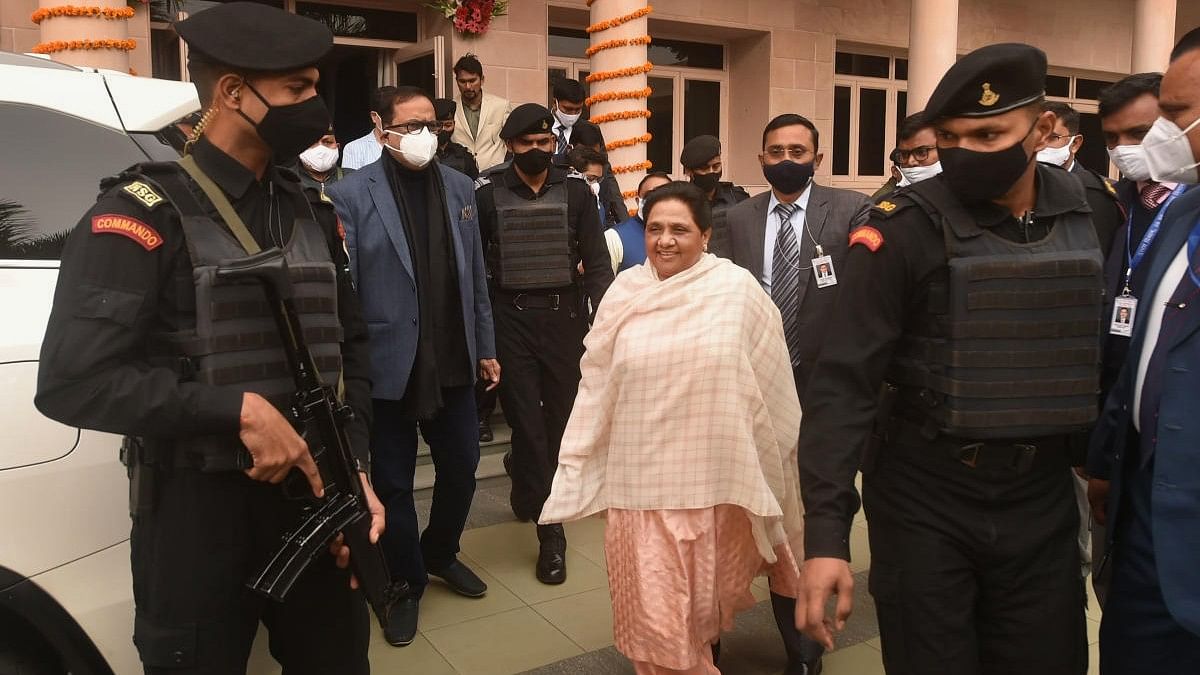
BSP Supremo Mayawati leaves after addressing a press conference on her birthday at the party office, in Lucknow, Saturday, Jan. 15, 2022
Credit: PTI Photo
Mayawati, the head of the Bahujan Samaj Party (BSP) and a former chief minister of Uttar Pradesh, has always maintained a distance from the media because she sees it as a component of the upper caste system that is inherently unfair to self-made leaders who belong to lower castes. She is both a Dalit and a woman leader who would have faced prejudice on both these fronts. It was, therefore, a bit of a coup to be granted an interview with her a quarter century ago when she was, at the age of 42, chief minister for a second time (she has been chief minister five times).
So it came to pass that not only did this author chat with Mayawati about her political concerns those days, but she also revealed facts such as her favourite hobby (gardening) and that she was proud of creating the garden in BSP founder, and her mentor, Kanshi Ram’s Delhi residence.
No matter how politically diminished she may appear today, make no mistake that Mayawati used to be an extraordinary figure in Indian politics, and a metaphor for Dalit empowerment. In her interview with this author then, Mayawati spoke about her dedicated work in Ambedkar villages (designated as such for government schemes) and justified prioritising lifting one section of society over others because of the history of subjugation.
She also took on the most powerful male figures symbolising feudal authority (that inevitably seeks to subjugate the lower castes). One of her actions during her early days as chief minister was to arrest many Thakur strongmen. Those days, Lucknow’s elite used to refer to Mayawati using derogatory, caste slurs — they could not stomach the fact that a woman, a Dalit too, dared to challenge them publicly!
Back then Uttar Pradesh had many a village where wells built with government funds would be located where the upper castes lived. These funds and development seldom reached parts of the village where scheduled castes lived; they were left to scramble for the meagre resources, along with everything else. Mayawati became an agent of change not just when she was in office, but also because her presence in the political sphere pushed social justice and Dalit assertion to the front.
That is why today it is almost tragic to see Mayawati choosing to be dysfunctional. The Congress leadership was keen to get the BSP on board and reached out to her to be part of the I.N.D.I.A. bloc for the 2024 elections. One rumour has it that she was even promised that she would be the prime ministerial face, while another rumour is that she demanded it as a condition to join the alliance.
What was, however, confirmed by sources is that Mayawati made such outrageous demands for various seats that she seemed more set on reducing the footprint of the Samajwadi Party than in creating a front to arithmetically take on the Bharatiya Janata Party (BJP) in the 80 Lok Sabha seats in Uttar Pradesh. Mayawati, apparently, would rather be irrelevant than in jail. One argument is that she is scared of corruption cases against her being created and/or revived should she begin forcefully opposing the BJP. By choosing to fight alone, she will be dividing the Opposition vote, and winning nothing for the BSP.
The BSP’s numbers over the years tell a story. In the 2009 Lok Sabha polls, it won 20 Lok Sabha seats from Uttar Pradesh. In the 2014 polls, during the Modi wave, the BSP won about 20 per cent of the votes polled in UP, but no seats. In 2019, the BSP and the SP fought the polls in an alliance, and the BSP got the same 20 per cent votes but bagged 10 seats. Yet, Mayawati has decided to fight alone in 2024.
To compound her problems, the BSP also performed poorly in the Assembly elections. At its peak, when the BSP won a simple majority in the Assembly in 2007, and Mayawati had her only full term as chief minister, the party had 30 per cent of the vote share. By 2017, when the BJP won the state elections, the BSP had a vote share of 22 per cent. But in the 2022 Assembly elections, the BSP's vote share crashed to just over 12 per cent, and it won only one seat in an Assembly of 403.
As the Dalits make up nearly 20 per cent of UP’s population, we must surmise that the BSP has lost nearly half its vote share to the BJP. The approach of the BJP is to include scheduled castes in the welfare net of the state and Centre, while the BSP’s approach was to combine that with empowerment. Now it seems that the leadership of the once fiery BSP is so disempowered that it cannot come up with a strategy to pull itself out of the quicksand.
(Saba Naqvi is a journalist and author.)
Disclaimer: The views expressed above are the author's own. They do not necessarily reflect the views of DH.